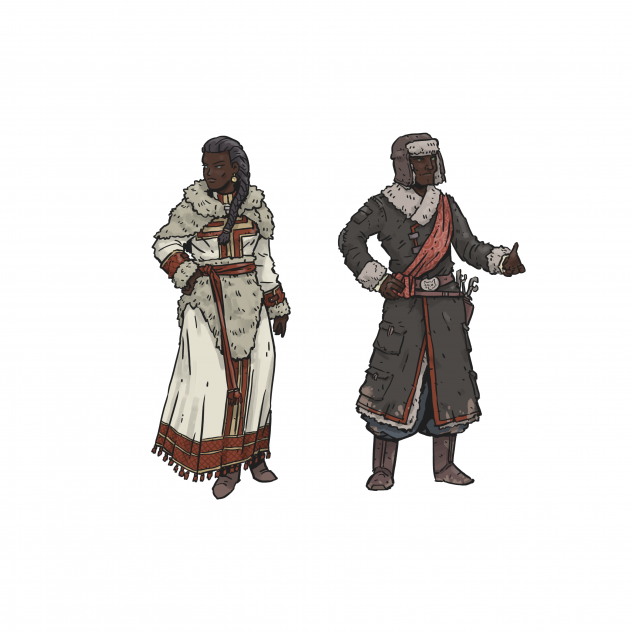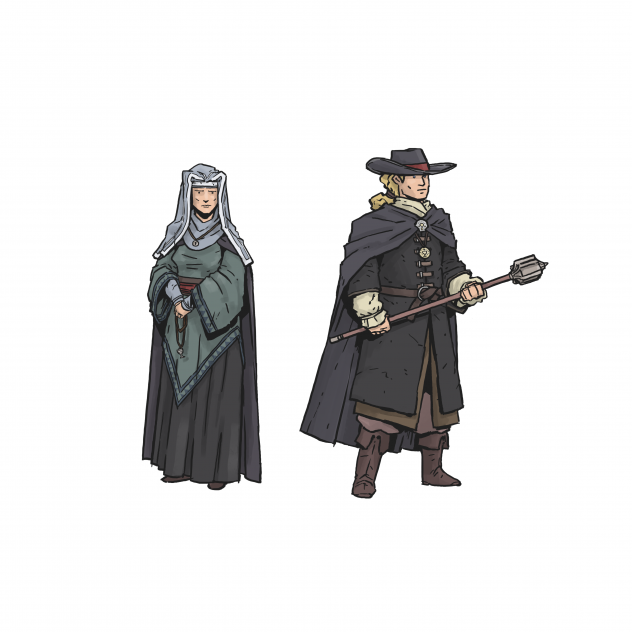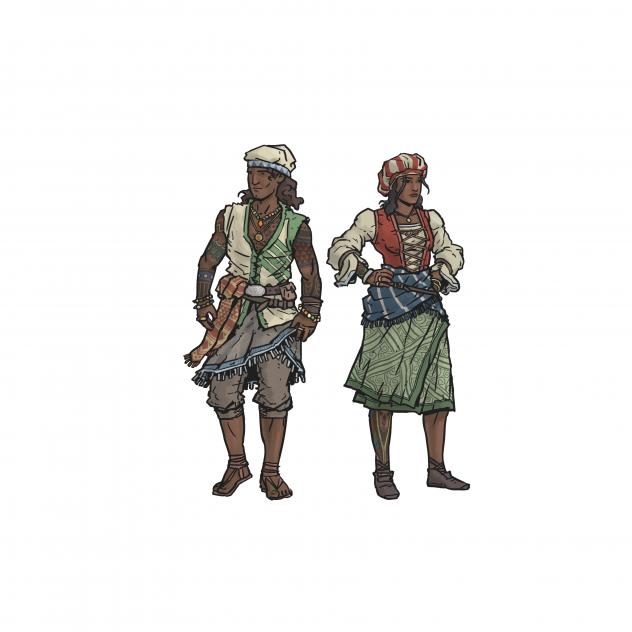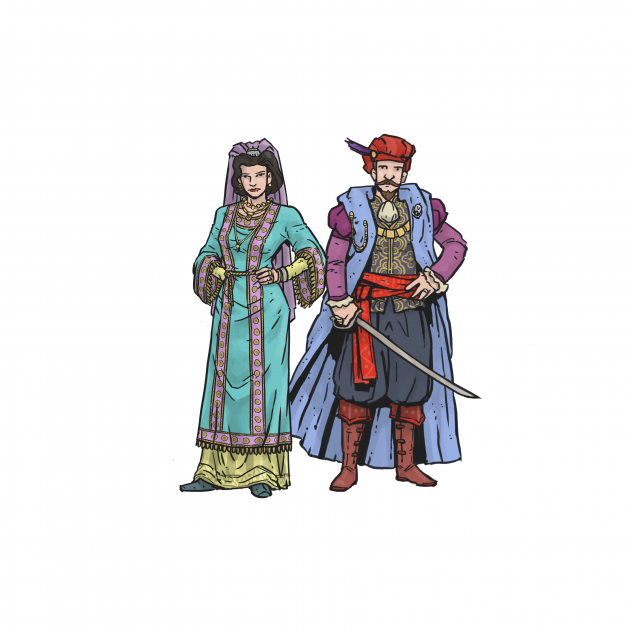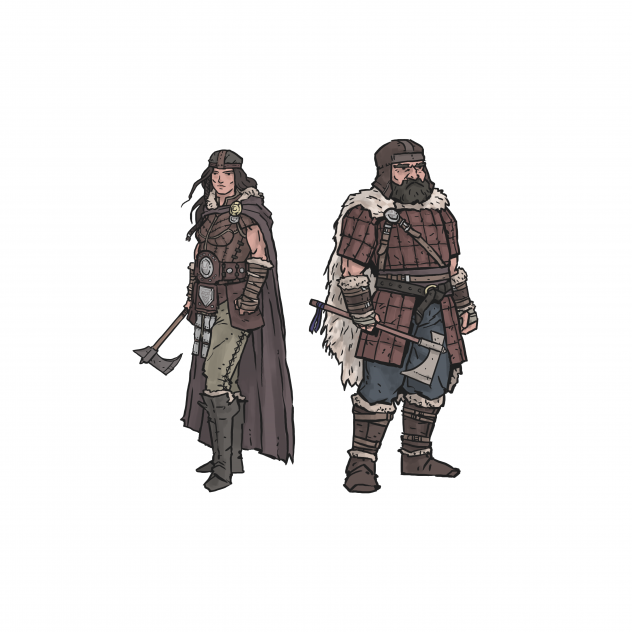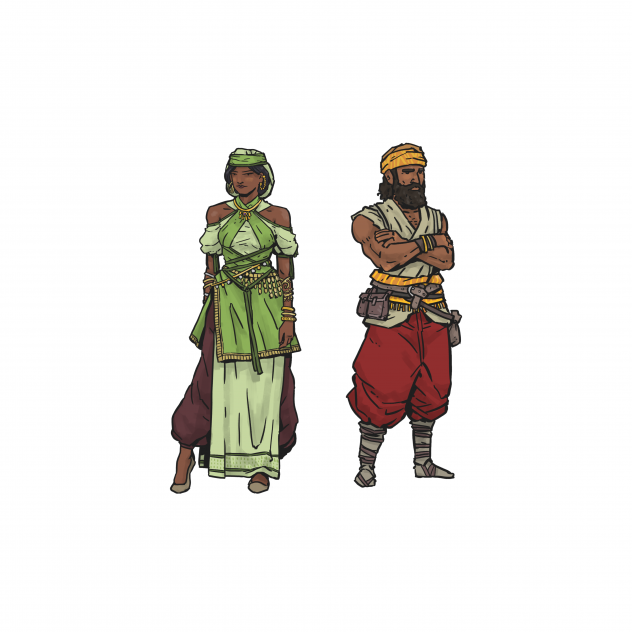CHARALI
FEATURES
Charali people hail from the vast plains on the southeastern portion of the continent. They are known far and wide for their horses, which are the best stock within the realm.
The Charali race is light complexioned, with blonde to red hair, and eye color ranging from green to grey. Most Charali are slightly built.
It is important to note that the Charali are nomads, and move with their horses throughout the plains of their land. There are no permanent settlements, nor are there schools of learning or other such ‘luxuries’. A Charali carries what he or she can with them, or on the backs of their horses.
A Charali in Lithmore for the first time will be somewhat wide-eyed, even after making the journey from their plains through other cities, at the splendor and grandiosity of the capital.
Note: Charali do not have what is considered ‘gentry’ according to Lithmorran standards. Among the Charali, wealthy horse breeders are considered nobility, though in the eyes of Lithmorrans, such Charali are merely freemen. In Lithmore, Charali (much like Hillmen) may never rise above the status of freemen, even if they share the blood of another race.
Note that if you choose the Charalin race in chargen, you will by necessity play a freeman. Charali are not allowed to select or rise to the status of gentry or nobility. They also may not lead legal guilds.
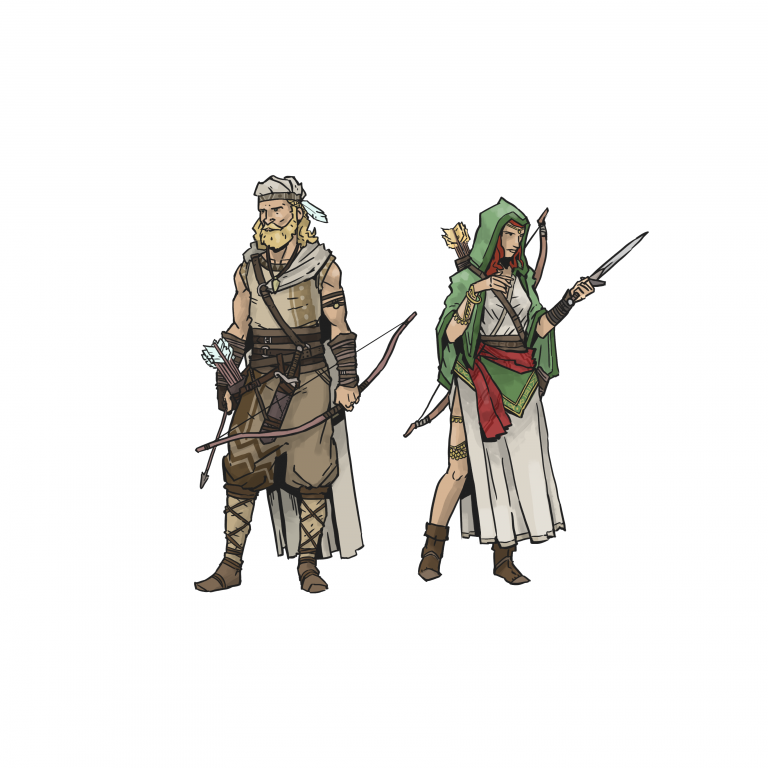
FAITH
Disparate communities in Charali typically have only small congregations, if any. As such, sermons tend to be fairly truncated and
address topics concerning the recent local gossip. These are led by missionaries determined to spread the faith to the unenlightened heathens. Still, the Holy Order has at best a minimal following in the Plains and maintains little impact on the Charalin or their way of life. However, its trappings have been interwoven almost inextricably with ancient tribal spiritualities and superstitions. The practicing Charalin make extensive use of saints, angels and demons now, in place of the old rites of spirit and ancestor worship. The lack of a set bishopric means that there is little in the way of “regular” practice of Davism in this region. Thus tribes can have widely disparate pseudo-pantheons of saints, devils, rituals and holidays.
FASHION
In dress, Charali are the most practically clothed, using indigenous materials, which include a wide variety of leathers and simply made cloth of felt. Because of this emphasis on practicality, men and women both wear pants or breeches, especially when hunting. On special occasions, men and women wear a long tunic-dress with side slits in place of the more practical tunic. During winters, felt is made in abundance and this is the only time sleeved-garments are worn. Although somewhat limited in style and cut, Charali clothing is a strong identifying mark by showing sub-regional, tribal, and personal affiliations. Such markings frequently occur in patterns of paint on leather, fringe, bonework, beadwork, as well as the occasional (and highly prized) feather or shell.
Basic Elements
Tunic: The basic tunic is made of felt, usually of natural or muted colors. Without sleeves, the tunic is ultimately practical and plain, lacking a collar. Wealthy or influential Charali men and women wear colorful and stylized vests of felt, often with complicated designs or applique patterns. The Charali tend towards more geometric than scenic patterns in their clothing, though sometimes they depict animals on garments and bags.
Headbands: The Charali wear their hair very long, and it’s almost always exceedingly thick and straight. Men and women may tie it back for hunting, but typically they wear only a leather or beaded headband. Whether leather or beadwork, the headband is of bright, beautiful pattern.
Jewelry: Made of bone and leather, the typical Charali rarely has metal jewelry, though tribal leaders and their close family may wear bronze.
Bracers and wristbands: The Charali all wear bracers and wristbands. In rough order, felt bands about the wrist, painted, beaded, fringed, boned or a combination thereof speaks of a common tribesman. Wisdoms (those over the age of 40) typically wear leather, and tribal leaders or distinguished hunters wear bronze bands.
Status: Charali fashion clearly communicates status and affiliations. The primary place for these identifying marks is through the headband and wrist bracer/bands. The most powerful person in a tribe is the most senior woman, and she sets herself apart with a colorfully beaded headband trailing dyed black feathers from a bird of prey.
Armor: When it comes to warfare, the gear that the Charali use is limited. Armor is not a large priority, and metal armors carry something of a religious stigma. The sheer amount of weight also eliminates it from the nomadic culture as it is not an everyday item. Their normal clothing is often what they wear to war. Depending on the season and the reason for the conflict, they may not wear much at all. Paint may be made from dyes and animal fat may be used, including ash, to decorate the body.
Weapons: Most of these are inherited as well. Metalworking is not a common trade among the Charali because of limited resource and the need for a stationary forge. Most of the blades or heads that the Charali have will have been acquired in trade. The most common melee weapons would be knives, spears, clubs, and axes. For range, the Charali rider would use their bows.
TRADE
The first thing that comes to mind when thinking of Charali is almost always horses. Known to sell for upwards of fifty gold pieces at times, Charali horses are amongst the best in all of the King’s territories. These exotic animals are praised for their beautiful coats and glossy hair, also used in decorative clothing and necklaces. Though the Charali people are primarily known for their skill in breeding champion horses, there are several other goods which have been exported from the Plains of late due to their exotic nature.
Grass and reed weavings have become exceptionally popular in Lithmorran and Vavardi homes, simply for their avant-garde flair in decorating the homes of the upper class. Also popular amongst the Charali people, and a trend beginning to become apparent in Vavard, is the making of felt from both human and animal hair. This material is highly durable and is useful in keeping warm in the harsh conditions of the Plains.
Of particular use to those in the city of Lithmore, salts and dung exported from the Plains have served the purpose of flavoring foods and for aid in
ire-building. Procured from the steppes of Charali, the salts exported from these lands are said to have a more granular texture and biting taste than those extracted from other areas. Charali horse dung, when dried, is rumored to rival even lamp oil in the duration of the fire it will create.
FOOD
The Charali people subsist largely on a diet composed of meat due to their hunter and gatherer nature. Most of the animals that the Charali have with them are horses, dogs, and sturdy cows. They strive to make full use of each animal that they kill for food, thus drinking mare’s milk, tanning the hides of sturdy cows used for meat and milk, and working the hair of horses bred for riding into felt.
The Plainsmen are known for their unique use of things found in the environment to use for food in times of scavenging and gathering. Of specific note is the use of long grasses in most meals made in Charali homes. It is said that the grass adds a special flavor to each dish and that its nutritional value is high. In the Charali quest to make full use of each part of their kills, they have developed many delicacies that perhaps the average Lithmorran would think disgusting. Charali are known to suck the marrow from animal bones or to drizzle it on their meals as a form of dressing. Another food-related custom in Charali is that in order for the senior-most woman in a tribe to ascend to power, she must swallow the eyes of a horse whole. It is said that this will double her honor, thrice her loyalty, and halve her enemies.
CUSTOMS
Given the harsh environment that the Charali have grown accustomed to living in, they have developed very strong hospitality rules to those whom they might receive as guests. The rationale for these adopted tenets stands because the nomadic peoples of the Plains must already face the dangers of their lands- why should they face the same while within their homes. As such, it is generally accepted amongst the Charali people that no murder or other foul play may ever occur within a man’s yurt or teepee. Once a man has shared food or water outside his home, the person receiving these favors is considered a guest and falls under the protection of the Charali who has shared them with him. To disobey either of these rules would be to bring a great dishonor to one’s family and ancestors.
When a person enters the camp of another, permission is first asked. They are often greeted with, “Have you eaten?” , A nod to the harsh life most Charalin live. If accepted, the host offers a place by the fire, food and water enough to comfort the guest. The refusal of hospitality is considered an insult. When accepting hospitality, one accepts the sovereignty of the yurt’s owner.
New arrivals to clans may be subject to the Law of Nature: the new arrivals are subject to single combat with the camp mistress and her first consort. First blood is usually more than enough to determine which will make decisions in the camp.
Charalin hospitality and efforts to maintain peace manifests itself in Charalin speech and phrasing. Occasionally, to solve any difficulties, they will engage in a broad series of white lies to smooth things over. It is not so much about the content of the words, but their intent and impact upon the environment and mood. This often called the “Charali bend” by outsiders. When dealing with other races, this has helped cultivate a general distrust of what a Charali says and gives them a reputation as liars. As a rule, a Charalin’s surname is often the name of their birth mother. Their Charalin name, given to them on their Naming Day, is secondary to their mother’s. Charali will often have a Davite name given or taken by them as well to make their passage through the Western territory easier. When a Charalin introduces himself or herself to a westerner, they will often say, “I am (order of birth) (son or daughter) of (mother), (Davist name).” It is rare to divulge their true Charalin name to an outsider.
MORALS The Charali people lead a very ritualistic way of life, their practices in warfare denoting this sentiment precisely. In open conflict, tribal leaders will meet in order to declare when, and for how long, a war shall last. Conflicts between tribes are typically resolved in these small-scale battles, and in only a few cases in history has a blood vendetta (war to the ultimate destruction of a tribe) been called. Given that the Charali believe that their ancestors watch their actions on Urth, death and dying in association with these tribal battles are dealt with ceremoniously. Special cares are taken to make sure that the bodies of the dead are not defiled in any way so that they may greet the ancestors without bringing shame to their families or tribes. Of particular note is the Charalin take on the premise of honesty. To the Plainsmen, honesty is not a matter of spoken word, but instead of intent. A Charali might say one thing, but in truth mean another. Much of their speech is made through plays on words- the Charali focus on positive manners and use speech to communicate only as a method of harmonizing each man with every other and the world as a whole. Speaking in this way is not considered to be dishonest amongst the Charali, but instead it is required to be an honorable and good person. Speaking honestly, in Lithmorran terms, would be a grave breach of the Charali protocol and would bring dishonor to ones tribe. Because of this unique manner of speaking, Lithmorrans often consider the Charali to be liars.
In this hunter and gatherer society, the sake of the tribe is often promoted before the sake of the self, and for this reason, honor is viewed as allegiance to the tribe. In these terms, one who does not perform his duties or has failed in them has set the tribe back, and will be shunned for a time appropriate in accordance with the duties he has been remiss in accomplishing. To bring shame or dishonor to the tribe or ones ancestors is considered one of the greatest wrongs amongst the Charali people and such an act is to be avoided at all costs.
GENDER BIAS
Within the Charali culture, there is a very strong feminine gender bias. As opposed to other cultures where women are seen as fragile and weak, the women of Charali tribes are seen to have great wisdom, organizational abilities, keen minds, and communication skills. This lends them to positions of leadership and affords them a marked respect. Men fulfill an important role in their culture, not only as hunters and warriors, but also protectors of the women of the tribe. Tasks accomplished by women, such as raising children, cooking and maintaining the yurt are not looked down upon, but rather as allocation of what is a natural outpouring of a womans best attributes. However, neither are the tasks of the men, and some women have been known to eschew families in order to take up the bow and knife.
Property and inheritances pass through the womans line rather than the father, as only the mother of the child is entirely assured in the procreation matter. Daughters are only slightly prefered over sons, and men who sire children on women may or may not be allowed into a woman’s home. Her family joins her in the raising of a child while the father remains with his own, unless given an invitation by the head of the household, the eldest woman present.
In times of war, male prisoners are often taken from other tribes and forced into slavery within the Charali camps, a juxtaposition of the concept of women being battle spoils in other cultures. In this case alone, men are seen as property, and the High Mother of the tribe usually decides into whose hands the male prisoners of war will fall. The male prisoner is forced to swear fealty to the tribe and its High Mother and is usually placed in the service of one of the women who lost her male protectors in battle. It is common for many of the adult women to have accumulated up to as many as three male servants through this process.
PERSPECTIVES
These quotes generally sum up the Charali thoughts about those from other regions from the perspective of Charali themselves:
Lithmorran:
“They slaughtered us once for our horses. Who says they won’t do it again?”
Vandagan:
“They are a cold people from a cold land and they see us as nothing but trade goods to ship off to Tubor.”
Vavardi:
“Impudent invaders who know nothing but greed. At least they wear their character on the outside: the more pretentious their clothing, the more worthless a person they are.”
Hill Folk:
“Fierce little folk as sturdy as the mountains they come from.”
Tubori:
“Keep your wits about you around them, else you will wind up a slave.”
Farin:
“Self-proclaimed ‘honorable warriors’ who buy our people to take them to barren lands and throw them in the path of the Daravi.”
Daravi:
“Cursed people that ride the sands south of Farin, bringers of war and destruction.”
Order:
“Remember who Dav was and what he did to us, and know that is who Davites look up to. That is all which needs to be said about them.”
Reeves:
“The reeves seek “justice”, but not yours. It is better to see to your own than waste your time speaking to them.”
Troubadours:
“It is a worthy task, to commit the histories to song and memory.”
Brotherhood:
“They are more honest than reeves. They’re not so pretentious as to say it is justice when they rob you blind.”
Merchants:
“Most are greedy children who would sell their own mothers for wealth. Remember this when you deal with them.”
Physicians:
“These understand the benefit of the plants and flowers that the Urth provides. Strange are the potions and pills they ruin them for.”
Council:
“The only thing worse than a self-important fool is a group of them.
